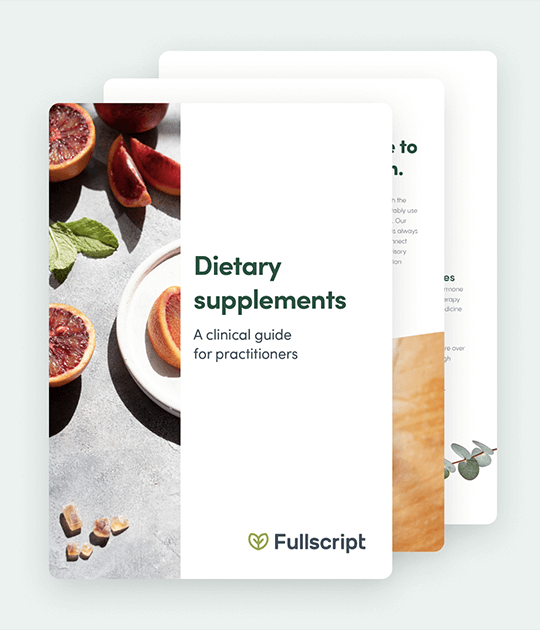Maintaining brain health is essential for optimal cognitive function, quality of life, and healthy aging. Cognitive impairment, which can impact individuals at any age, results in difficulty with processes such as language, memory, and judgement, affecting everyday life.
Causes of cognitive decline such as brain injury may be outside of your control. However, other factors that cause cognitive and memory problems may be addressed through dietary and lifestyle approaches, such as vitamin supplements for brain health. (2)
Quality supplement plans in less than a minute
Understanding Cognitive Function and Decline
The brain and nervous system are responsible for many cognitive functions, including attention, memory, information processing, and higher-level cognitive skills called executive functions. (10) Cognitive impairment, commonly measured by standardized tests, refers to alterations in cognitive performance. A range of changes to cognitive functions often precedes clinical dementia, a neurodegenerative condition characterized by global cognitive decline and a variety of symptoms, (1) such as memory loss and impaired communication, recognition, and judgement. (6)
Vitamins for Brain Health
Your central nervous system (CNS), made up of the brain and spinal cord, relies on essential nutrients to support normal cognitive function and brain health. Consuming these nutrients in your diet or as dietary supplements may help maintain cognitive function, improve memory, and reduce the risk of dementia and other cognitive conditions. (16)
The vitamins outlined below have been shown to exert numerous health benefits, particularly for brain health.
1. Beta-Carotene, Vitamin A, and Brain Function
β-carotene (beta-carotene), a precursor to Vitamin A in the body, is found in a variety of colorful fruits and vegetables. (3) One study of octogenarians and centenarians found that serum (blood) levels of certain nutrients, including β-carotene, were positively associated with cognition in these populations. (10)
Further, a randomized controlled trial that assessed the effects of long-term β-carotene supplementation in males over 65 years old found that long-term supplementation (an average of 18 years) was associated with a significantly higher global score than in the placebo group. In the study, the global score included measures of general cognition, verbal memory, and category fluency (the ability to list words when given a category). (7)
2. B Vitamins
The eight B vitamins are a group of water-soluble vitamins that are involved in various cellular functions throughout the body. According to this B vitamin study, as a group, they contribute to brain health by supporting reactions involved in energy production, synthesis and repair of DNA and RNA, methylation, and production of multiple signaling molecules and chemicals used by the nervous system. (11)
A systematic review of individuals over 40 years old without dementia found that taking B vitamins, including vitamin B6 (pyridoxine), B9 (folate/folic acid), and vitamin B12 (cobalamin), for at least three months improved episodic memory and global cognition. (19)
Research suggests that for individuals deficient in one or more of the B vitamins, supplementing with a B-complex supplement may be more beneficial for brain health than using isolated vitamin supplements. (11)

3. Vitamin C
Vitamin C is an essential water-soluble vitamin that must be obtained from dietary sources as it cannot be produced by the body. (9)(20) Research has demonstrated various roles of vitamin C in the brain, which include supporting neurodevelopment, neurotransmitter function, angiogenesis (blood vessel formation), and antioxidant function. Additionally, vitamin C supports regeneration (renewal) of other antioxidants, such as glutathione and vitamin E. (20)
One review study that examined the relationship between vitamin C levels and cognitive performance in both healthy and cognitively impaired individuals found that the cognitively intact (healthy) individuals had higher blood concentrations of vitamin C. (20)
4. Vitamin E
Also included in the best cognitive vitamins, vitamin E is a group composed of eight natural compounds, including tocopherols and tocotrienols. As a fat-soluble antioxidant, vitamin E protects against the production of reactive oxygen species and may help prevent chronic conditions associated with these damaging free radicals. (14)
One study examined the levels of vitamin E compounds in adults with mild cognitive impairment (MCI) and Alzheimer’s disease (AD), a form of dementia. The researchers found that low levels of tocopherols and tocotrienols were associated with an increased risk of MCI and AD. (12)
5. Vitamin K
Another fat-soluble vitamin, vitamin K is found in food as phylloquinone (K1) and several menaquinones (forms of K2). (1) In the nervous system, vitamin K helps activate certain proteins involved in the survival of brain cells and supports the synthesis of sphingolipids, a component of the myelin sheath that insulates nerves. (1)(5)
Vitamin K insufficiency has been associated with low behavioral and cognitive performance. (5) Higher levels of phylloquinone have been associated with greater verbal episodic memory, one aspect of memory performance. (1) Additionally, recent studies show that menaquinone-4 (MK-4) may protect against inflammation and oxidative stress, processes that are implicated in neurodegeneration. (1)

Other Considerations for Healthy Brain Function
These brain supplement ingredients are not the only factor to keep in mind when it comes to brain health. There are a variety of other dietary and lifestyle factors that may contribute to brain health and prevent conditions such as neurodegenerative diseases. Start by recognizing and addressing risk factors for cognitive decline, such as nutrient deficiencies, a high-sugar, high-fat diet, and physical inactivity. (8)(15)
Getting adequate sleep is important, as acute (one night) and ongoing sleep deprivation has been associated with increased formation of β-amyloid plaques in the brain, a hallmark of Alzheimer’s disease. (18) Remaining cognitively active through a stimulating career, ongoing education, and leisure activities may also help support brain function. (4)
The Bottom Line: Brain Health Is Important at Any Age
Supporting your brain health and preventing cognitive decline is important at any age. Evidence shows that specific nutrients and brain function are closely related; conversely, insufficiency of certain nutrients may result in reduced cognitive function.
If you’re a patient, ensure you’re meeting your requirements through a nutritious diet and consider working with an integrative healthcare practitioner to determine whether these brain health supplements are right for you.
If you’re a practitioner looking to recommend brain supplements to patients, create a Fullscript account for free online today.
Quality supplement plans in less than a minute
- Alisi, L., Cao, R., De Angelis, C., Cafolla, A., Caramia, F., Cartocci, G., Librando, A., & Fiorelli, M. (2019). The relationships between vitamin K and cognition: A review of current evidence. Frontiers in Neurology, 10, 239.
- Centers for Disease Control and Prevention. (2019, September 5). Healthy Brain Initiative. Retrieved from https://www.cdc.gov/aging/healthybrain/
- Chea, E. P., Lopez, M. J., & Milstein, H. (2020). Vitamin A. In StatPearls. StatPearls Publishing. Retrieved from https://www.ncbi.nlm.nih.gov/books/NBK482362/
- Cheng, S.-T. (2016). Cognitive reserve and the prevention of dementia: The role of physical and cognitive activities. Current Psychiatry Reports, 18(9), 85.
- Chouet, J., Ferland, G., Féart, C., Rolland, Y., Presse, N., Boucher, K., Barberger-Gateau, P., Beauchet, O., & Annweiler, C. (2015). Dietary vitamin K intake is associated with cognition and behaviour among geriatric patients: The CLIP Study. Nutrients, 7(8), 6739–6750.
- Duong, S., Patel, T., & Chang, F. (2017). Dementia: What pharmacists need to know. Canadian Pharmacists Journal, 150(2), 118–129.
- Grodstein, F., Kang, J. H., Glynn, R. J., Cook, N. R., & Gaziano, J. M. (2007). A randomized trial of beta carotene supplementation and cognitive function in men: The Physicians’ Health Study II. Archives of Internal Medicine, 167(20), 2184–2190.
- Hamer, M., & Chida, Y. (2009). Physical activity and risk of neurodegenerative disease: A systematic review of prospective evidence. Psychological Medicine, 39(1), 3–11.
- Hansen, S. N., Tveden-Nyborg, P., & Lykkesfeldt, J. (2014). Does vitamin C deficiency affect cognitive development and function? Nutrients, 6(9), 3818–3846.
- Johnson, E. J., Vishwanathan, R., Johnson, M. A., Hausman, D. B., Davey, A., Scott, T. M., Green, R. C., Miller, L. S., Gearing, M., Woodard, J., Nelson, P. T., Chung, H.-Y., Schalch, W., Wittwer, J., & Poon, L. W. (2013). Relationship between serum and brain carotenoids, α-tocopherol, and retinol concentrations and cognitive performance in the oldest old from the Georgia Centenarian Study. Journal of Aging Research, 2013, 951786.
- Kennedy, D. O. (2016). B vitamins and the brain: Mechanisms, dose and efficacy–A review. Nutrients, 8(2), 68.
- Mangialasche, F., Xu, W., Kivipelto, M., Costanzi, E., Ercolani, S., Pigliautile, M., Cecchetti, R., Baglioni, M., Simmons, A., Soininen, H., Tsolaki, M., Kloszewska, I., Vellas, B., Lovestone, S., Mecocci, P., & AddNeuroMed Consortium. (2012). Tocopherols and tocotrienols plasma levels are associated with cognitive impairment. Neurobiology of Aging, 33(10), 2282–2290.
- McCleery, J., Abraham, R. P., Denton, D. A., Rutjes, A. W., Chong, L.-Y., Al-Assaf, A. S., Griffith, D. J., Rafeeq, S., Yaman, H., Malik, M. A., Di Nisio, M., Martínez, G., Vernooij, R. W., & Tabet, N. (2018). Vitamin and mineral supplementation for preventing dementia or delaying cognitive decline in people with mild cognitive impairment. Cochrane Database of Systematic Reviews, 11, CD011905.
- National Institutes of Health Office of Dietary Supplements. (n.d.). Vitamin E. Retrieved from https://ods.od.nih.gov/factsheets/VitaminE-HealthProfessional/
- Poulose, S. M., Miller, M. G., Scott, T., & Shukitt-Hale, B. (2017). Nutritional factors affecting adult neurogenesis and cognitive function. Advances in Nutrition, 8(6), 804–811.
- Rutjes, A. W., Denton, D. A., Di Nisio, M., Chong, L.-Y., Abraham, R. P., Al-Assaf, A. S., Anderson, J. L., Malik, M. A., Vernooij, R. W., Martínez, G., Tabet, N., & McCleery, J. (2018). Vitamin and mineral supplementation for maintaining cognitive function in cognitively healthy people in mid and late life. Cochrane Database of Systematic Reviews, 12, CD011906.
- Schulz, J. B., & Deuschl, G. (2015). . Der Nervenarzt, 86(8), 954–959.
- Shokri-Kojori, E., Wang, G.-J., Wiers, C. E., Demiral, S. B., Guo, M., Kim, S. W., Lindgren, E., Ramirez, V., Zehra, A., Freeman, C., Miller, G., Manza, P., Srivastava, T., De Santi, S., Tomasi, D., Benveniste, H., & Volkow, N. D. (2018). β-Amyloid accumulation in the human brain after one night of sleep deprivation. Proceedings of the National Academy of Sciences of the United States of America, 115(17), 4483–4488.
- Suh, S. W., Kim, H. S., Han, J. H., Bae, J. B., Oh, D. J., Han, J. W., & Kim, K. W. (2020). Efficacy of vitamins on cognitive function of non-demented people: A systematic review and Meta-Analysis. Nutrients, 12(4).
- Travica, N., Ried, K., Sali, A., Scholey, A., Hudson, I., & Pipingas, A. (2017). Vitamin C status and cognitive function: A systematic review. Nutrients, 9(9).






